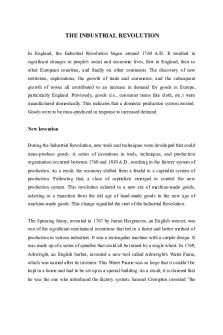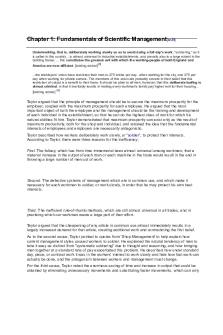The Scientific Revolution PDF

| Title | The Scientific Revolution |
|---|---|
| Author | Courtney Sackett |
| Course | Humanities World Civilization |
| Institution | Indiana Wesleyan University |
| Pages | 5 |
| File Size | 105.3 KB |
| File Type | |
| Total Downloads | 33 |
| Total Views | 197 |
Summary
Professor is Mark Smith. These lecture notes follow his lecture outline and adjustments are made based on PowerPoint lecture additions and points emphasized verbally. ...
Description
The Scientific Revolution Rise of the Modern Mind World Civilizations HST180A Dr. Smith 4.20.18 Background 1. Judeo-Christian Biblical worldview a. Humankind created in the image of God i. Mind of the maker ii. Creatures who share in that rational ability b. Imago Dei and the mind of man c. Doctrine of providence—world has order & purpose 2. Greek philosophical mind a. Categorizing and systematizing the world (Aristotle) b. Understanding the world rationally i. Tradition of explaining the world in natural and rational terms c. Aristotle’s geocentric cosmos i. Universe according to Aristotle 1. Geocentric 2. Earth-centered 3. Fixed & motionless ii. Aristotle, THE ancient authority 1. We know reality by observation iii. Role of ancient authorities 1. Authority is to be accepted and trusted d. Augustine’s “two books” i. Two meaning of knowing 1. Faith (Scripture as revelation) 2. Reason 3. Both…and philosophy ii. Two sources or “books” 1. Scripture 2. Nature iii. “All truth is God’s truth” iv. superiority of Divine revelation v. Scientific Revolution occurred within a Christian world & worldview vi. Was initially no war between religion & science vii. Supposed warfare actually begin in the 19th century e. Nicolas Copernicus d. 1545 i. Purpose of Heliocentric Theory 1. First modern to posit heliocentric theory 2. Purpose of theory
a. To know the truth, and thus, glorify God 3. Dedicated to Pope 4. Limitations of Copernicus’ view a. Proposed perfect circles around the sun b. Didn’t understand elipses ii. On the Revolution of Heavenly Spheres 1543 Century of Genius—17th century 1. Astronomy a. Johannes Kepler 1571-1630 i. Protestant Astronomer ii. Doing Science to “Glory of God” iii. Mathematics and observation iv. Laws of planetary motion 1. Elliptical paths of the planets 2. God throws a knuckleball… we don’t have God figured out b. Galileo Galilei 1564-1642 “Father of Modern Science” i. Flipping the Augustinian Model 1. Nature is the ‘better’ book than Faith 2. Chooses reason over revelation 3. Which book gives us the best picture of God? ii. God’s Word vs. God’s work 1. Primacy of nature over grace 2. Primacy of reason over revelation iii. Why Galileo’s Father of Modern Science 1. Telescope invented in Netherland 1608 2. Galileo’s new & improved telescope iv. Contributions 1. Telescope 1609 2. Jupiter’s moons a. Not everything revolves around the sun (Aristotle) 3. Mountains & Craters on the Moon a. Not made out of a perfect 5th essence b. Earth, water, fire, air… heavenly essence? Nope! 4. Spots on the sun v. Clash with Church & Papal Inquisition 1. Real conflict: Trial of Galileo 2. Real opponents: theologians or scientists? a. Scientists bring Galileo against the Church 3. Culpability of the Church: Recantations & Apologies a. The Church’s real problem i. Uncritical acceptance of science from Greeks ii. Old Science vs. New Science 4. Aquinas writes his theology against him a. Official apology from Pope John Paul II in 1992
c. Paracelsus i. Chemical treatment of illness (drugs) ii. Old paradigm from Greeks: “contraries cure” iii. New paradigm: “like cures like” d. William Harvey i. Discovered the circulatory system ii. Blood & arteries circulate blood through the body 1. Studying the book of nature also tells us something about God and about humans… but not everything that’s important 2. Scientific Method a. Francis Bacon 1561-1626 i. Novum Organum (New Science/Instrument) 1620 1. “Father of Modern Empiricism” 2. what we know is what we can see, touch and measure 3. Aristotle death grip a. We have elevated Aristotle to an infallible source of truth ii. Popularizing Scientific Method & Body of Knowledge 1. Greater room of questions iii. “Knowledge is Power” 1. knowledge is virtue (Socrates) b. Rene Descartes 1596 i. Deductive method (from general premises to a particular truth) ii. “Father of Modern Philosophy” iii. Systematic Application of Doubt 1. Certain only of his doubt 2. “cogito ergo sum” I think, therefore I am 3. Father of Modern Rationalism: Question Authority a. New authority to be trusted b. Age of Reason iv. Mechanical view of the cosmos c. Isaac Newton 1642-1727 i. Principia Mathematica 1687 ii. Clockwork Mechanism 1. Natural laws 2. Law of gravity iii. Natural Law iv. Seeds of Deism v. Grand Synthesizer of Scientific Revolution 1. Takes all the philosophers and makes a system out of it 3. Scientism vs. science a. Science as a worldview i. Traditional religious view: Spirit is fundamental, matter is derivative ii. Scientific view: matter is fundamental, Spirit is derivative iii. From “Theology as Queen of the Sciences” to “Science is King”
1. Science as the new ‘golden calf’ as a potential idol to steal our heart away from the Giver iv. Falling into naturalism 1. Natural world is the ONLY reality b. Scientism Adds to Two Corollaries i. Scientific method is most reliable or only method of getting truth ii. Science deals with most fundamental issues of life iii. Has science become the new ideal? 4. 18th Century Enlightenment to follow: the age of Reason a. “the Enlightenment was the conscious effort to apply the rule of reason to every aspect of life” (The Age of Reason—Reason is KING) b. reason as primary guide for human conduct c. Key Concepts i. Reason (faith in reason… sola ratia… reason alone) ii. Natural law iii. Progress (science leads to a perfected society… utopia) d. Older European worldview i. “Faith and reason” ii. from a reasonable faith to a faith in reason e. Deism—God the Clockmaker i. No supernatural intervention/revelation 1. No miracles 2. So… who is Jesus? A great religious teacher, but not God ii. God works only through natural laws iii. God is known only through natural reasons iv. “Secular” worldview (Closed system with God locked outside) f. Wars of Religion follow reformation g. The Jefferson Bible i. Like the ethical & moral teaching of Jesus ii. Embarrassed by the miracles & supernatural iii. His bible ends with the death of Jesus and not the resurrection h. Compromise of Modern World i. Secularization of Politics & Society ii. Privatization of Religion i. Political implications: Reform or Revolution? i. American Revolution 1775-1783 ii. French Revolution 1789-1799 1. Rejection of Divine right of kings 2. New hostility to Christianity 3. Ultimately a rejection of revealed religion 4. Modern secularism 5. Modern world values individual freedom not submission to authority
6. Modern world values equality not the hierarchy of the Great Chain of Being...
Similar Free PDFs

The Scientific Revolution
- 5 Pages

THE Industrial Revolution
- 4 Pages

Using The Scientific Literature
- 16 Pages

The American Revolution summary
- 5 Pages

The-Cuban-Revolution
- 12 Pages

The third industrial revolution
- 2 Pages

The French and American Revolution
- 10 Pages
Popular Institutions
- Tinajero National High School - Annex
- Politeknik Caltex Riau
- Yokohama City University
- SGT University
- University of Al-Qadisiyah
- Divine Word College of Vigan
- Techniek College Rotterdam
- Universidade de Santiago
- Universiti Teknologi MARA Cawangan Johor Kampus Pasir Gudang
- Poltekkes Kemenkes Yogyakarta
- Baguio City National High School
- Colegio san marcos
- preparatoria uno
- Centro de Bachillerato Tecnológico Industrial y de Servicios No. 107
- Dalian Maritime University
- Quang Trung Secondary School
- Colegio Tecnológico en Informática
- Corporación Regional de Educación Superior
- Grupo CEDVA
- Dar Al Uloom University
- Centro de Estudios Preuniversitarios de la Universidad Nacional de Ingeniería
- 上智大学
- Aakash International School, Nuna Majara
- San Felipe Neri Catholic School
- Kang Chiao International School - New Taipei City
- Misamis Occidental National High School
- Institución Educativa Escuela Normal Juan Ladrilleros
- Kolehiyo ng Pantukan
- Batanes State College
- Instituto Continental
- Sekolah Menengah Kejuruan Kesehatan Kaltara (Tarakan)
- Colegio de La Inmaculada Concepcion - Cebu








